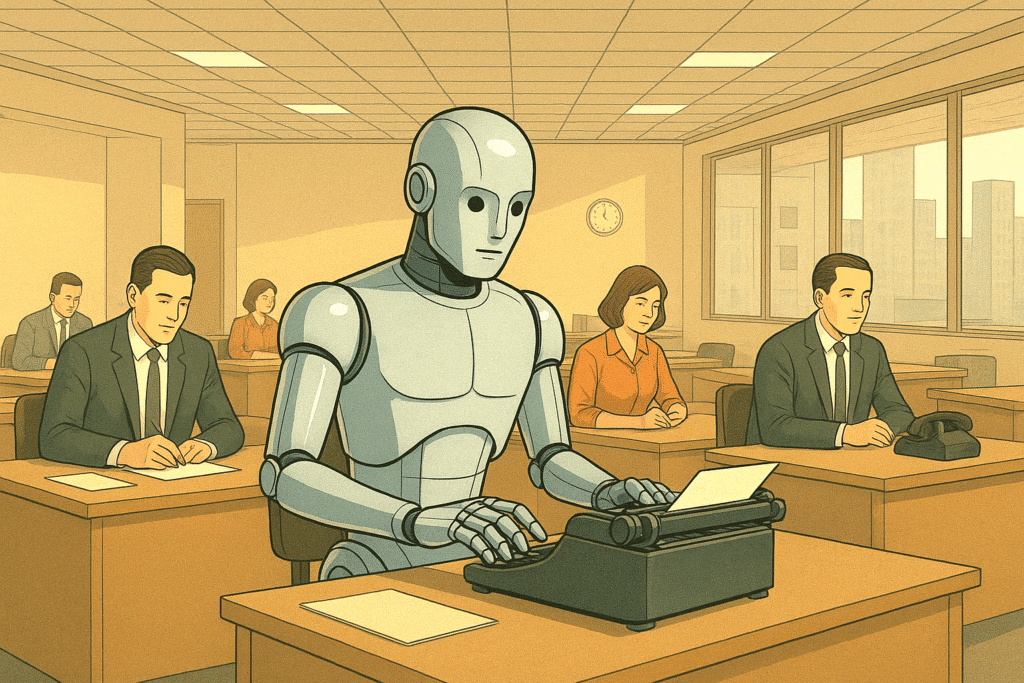The marketing landscape is undeniably in the midst of a radical transformation. While terms like “automation” and “data-driven insights” dominate conversations, painting a picture of a future where algorithms dictate every interaction, it’s crucial to remember that at the heart of every successful marketing strategy lies a fundamental, unchanging truth: human connection, oversight and curation.
This revolution isn’t about machines replacing people; it’s about empowering marketers to forge deeper, more meaningful bonds with their audiences. Let’s explore why the human touch remains irreplaceable in this new era.
Critical: Voice, Strategy, and Emotional Resonance
In an age where technology can generate text, images, and even videos at lightning speed, the question naturally arises: how does human content creation fit in? The answer is clear: the human touch remains not just critical, but irreplaceable.
While technology, including AI tools, can be a powerful assistant in the content creation process – helping with research, initial drafts, and even suggesting keywords – it fundamentally lacks the qualities that make content truly impactful and memorable:
- Real World Experience: AI lacks real and personal experiences to pull from. Technology often draws from existing data, making its output inherently derivative. It struggles to develop a distinct brand voice, inject humor, express genuine emotion, or truly capture the unique personality that sets a brand apart. Human marketers bring their own experiences, perspectives, and authentic voice to the table, creating content that feels real and relatable.
- Strategic Direction and Intent: Tools can generate text, but they don’t understand the “why” behind the message. Human marketers provide the strategic intent, aligning content with broader business goals, understanding market shifts, and predicting how content will resonate with a specific audience at a specific point in their journey. This requires foresight, critical thinking, and a deep understanding of human psychology that technology doesn’t possess.
- Emotional Nuance and Empathy: The ability to evoke genuine emotion – whether it’s joy, urgency, understanding, or inspiration – is a uniquely human capacity. Technology struggles with the subtle nuances of human emotion, often producing content that feels bland or even inappropriate when dealing with sensitive topics. Human creators can craft narratives that tap into shared experiences, build empathy, and foster a powerful emotional connection with the audience.
- Originality and Breaking the Mold: Technology excels at pattern recognition and replication. True creativity often involves breaking patterns, offering novel insights, or presenting information in a completely fresh and unexpected way. Human imagination is boundless, leading to truly innovative campaigns and ideas that technology, by its very nature, is not designed to originate.
Think of technology as a sophisticated brush, but the human marketer is the artist. The brush can execute strokes with precision, but only the artist possesses the vision, the emotional intelligence, and the creative spark to paint a masterpiece that genuinely resonates and moves people.
Hyper-Personalization: The Art of Knowing Your Audience (Without Being Creepy)
Advanced analytical tools and AI are marvels when it comes to hyper-personalization. They can analyze vast amounts of data – Browse history, purchase patterns, demographics, even real-time behavior – to deliver incredibly tailored experiences. This means showing the right product to the right person at the right time, offering content that genuinely resonates, and making every interaction feel unique.
However, there’s a fine line between personalized and creepy. Without human oversight, technology-driven personalization can sometimes cross into territory that feels intrusive or uncanny. Imagine getting an ad for something you just thought about, or receiving a marketing text that knows too much. We’ve all gotten Facebook ads about something we were just talking about – something we haven’t even searched for or viewed online. It’s unsettling to say the least
The human element is essential for:
- Empathy and Nuance: A human marketer understands the emotional context behind data. They can interpret sentiment, grasp cultural nuances, and recognize when an automated message might be misinterpreted or poorly received. This intuition and ability to discern when a personalization becomes “too much” is something pure technology currently lacks.
- Building Genuine Trust: While technology can predict needs, a personal touch – a thoughtful follow-up, a sincere apology, or a truly unique recommendation that shows genuine understanding – is what builds lasting trust and loyalty. Clients still desire that authentic interaction from a real person, especially when dealing with complex issues, seeking personalized advice, or feeling truly seen and valued beyond a data point. It’s the difference between a system knowing your birthday and a human sending a handwritten card. Which is better? A face to face lunch or a Zoom meeting and a Door Dash?
Intelligent Automation: Automating the Mundane, Freeing the Creative
One of the most immediate and tangible benefits of the marketing revolution is its ability to automate repetitive, time-consuming tasks. By offloading the “mundane” to machines, marketers are freed up to focus on what truly differentiates their brand and drives impactful results: overall strategy, creativity, and human elements.
Here are examples of how technology and intelligent tools can take over repetitive tasks, liberating human potential:
- Data Entry & Management: Tools like Customer Relationship Management (CRM) systems (e.g., HubSpot, Salesforce) can automatically capture and organize customer data from various touchpoints (website forms, sales calls, social media interactions), eliminating tedious manual input and sometimes improve data accuracy.
- Reporting & Analytics: Platforms such as Google Analytics, marketing automation platforms with robust reporting, or specialized analytical tools can generate comprehensive performance reports, identify trends, and even highlight anomalies that would take hours for a human analyst to uncover. They can process vast datasets in real-time, providing actionable insights.
- Scheduling & Campaign Management: Marketing automation platforms (e.g., Mailchimp, GetResponse, Pardot) allow marketers to set up complex email sequences, schedule social media posts across multiple platforms, and manage multi-channel campaigns with automated triggers, ensuring messages are delivered at the optimal time to the right audience.
- Basic Customer Service: Chatbots and virtual assistants can handle common customer queries, provide instant answers, and triage more complex issues to human agents, significantly improving efficiency and response times.
- Initial Content Brainstorming & Outlining: Generative text tools can quickly create topic ideas, suggest headlines, and produce basic outlines for articles, emails, or social media posts. While not fully writing, they provide a significant head start and help overcome writer’s block.
By leveraging these intelligent automation tools, marketers gain invaluable time. This newfound freedom allows them to step back from the tactical weeds and dedicate more energy to strategic thinking, developing innovative campaigns, refining brand messaging, and most importantly, fostering the authentic human connections that resonate deeply with audiences.
Technology as a Tool: The Power of the Best Creators and Problem-Solvers
This marketing revolution, fueled by technology, is not about leveling the playing field in a way that diminishes human talent. Instead, it’s about amplifying the capabilities of the best creators and problem-solvers.
Think of technology as a sophisticated tool – like a powerful camera, advanced editing software, or a cutting-edge musical instrument. Everyone might have access to similar equipment, but only the most skilled photographers, editors, or musicians can create masterpieces. The same applies to marketing:
- The “How” You Use the Tool Matters: When everyone has access to increasingly sophisticated tools, the true differentiator becomes how you use them. Do you use automation and data insights to simply churn out generic content and impersonal messages, or do you leverage them strategically to enhance your unique human capabilities? The best marketers will use technology not as a crutch, but as a tool to elevate their creative output and strategic thinking.
- Your Innate Human Skills Are Superpowers: Technology excels at pattern recognition, data processing, and automation. But it cannot replicate truly human attributes:
- Creativity and Imagination: The ability to conceive truly novel ideas, tell compelling stories, and break through conventional thinking remains distinctly human.
- Critical Thinking and Strategic Foresight: Interpreting complex data, understanding market shifts, anticipating future trends, and crafting long-term strategies that align with human values requires human judgment.
- Empathy and Emotional Intelligence: Connecting with an audience on an emotional level, understanding unspoken needs, and building genuine rapport relies on human empathy.
- Problem-Solving: While technology can identify problems and suggest solutions based on data, complex, ambiguous, or unprecedented challenges still require human ingenuity and the ability to think outside predefined algorithms.
- The Advantage of Adaptation and Innovation: The marketers who will thrive are those who embrace technology as a partner, constantly learning, experimenting, and finding new ways to integrate tools to serve human-centric marketing goals. They see these advancements not as threats, but as opportunities to innovate, differentiate, and deliver greater value.
As long as human insight guides the strategic direction, human creativity infuses content with soul, and human empathy drives connection, the marketers who possess these qualities will always be at the forefront of the revolution. They will leverage technology to achieve unprecedented levels of impact and engagement, proving that in a world of ever-advancing machines, the enduring power of human connection remains the ultimate competitive advantage.




